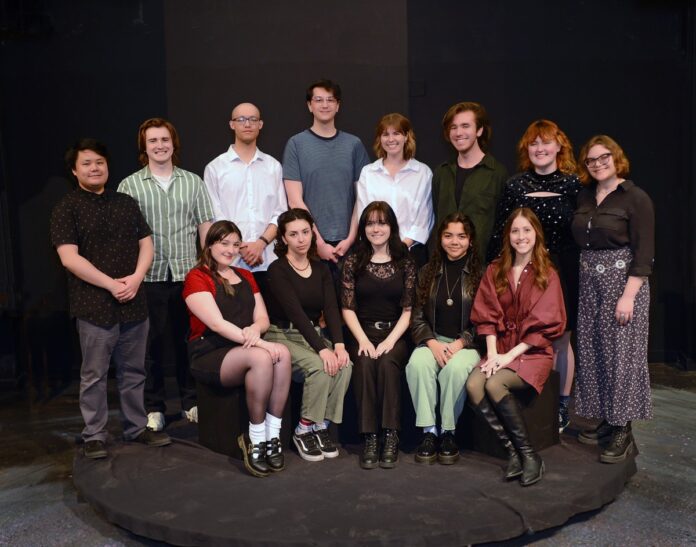
Tell us about your personal and professional background.
I have an MA in Theatre Arts from SDSU. I’ve spent 31 years teaching high school, and 22 years teaching Acting and Directing at Grossmont College, and have directed a dozen productions for the college. I’ve also written six plays that were produced at the college. In the “real world” of theatre, I spent a decade as the Associate Artistic Director of the San Diego Civic Light Opera (Starlight Theatre in Balboa Park).
During that time I produced and directed some 30 plays, including working on some Craig Noel Award winning productions. I was also privileged to serve as the A.D. on a staged reading of Dustin Lance Black’s play “8,” starring Richard Dreyfus, Annette O’Toole, and Lance Bass.
How did you enter this field?
My parents were involved at the Pasadena Playhouse before I was born, so you might say I was born into a theatre-loving family. But I also credit my mentor, Bobbi Jordan, for giving me the push towards directing and pursuing theatre beyond high school.
What’s the most rewarding aspect your job?
As a director, I love seeing a collaborative vision come together. As a professor, I love seeing my students have their “aha!” moment – making a creative breakthrough, discovering something, or just challenging themselves to be better human beings.
What don’t people understand about acting, being an acting student and an acting instructor?
People don’t understand that acting is not as simple as putting on a costume and reciting lines.
When an actor truly “inhabits” a character, there is something magical that happens. Acting students must learn how to be vulnerable, let go, and fully commit to their characters.
An acting instructor needs patience, understanding, and the ability to guide students through their journey of discovery.
Tell us about the genesis of An Evening of One Acts (March 24, see calendar listings)
We started discussing this idea just before the pandemic started. I teach the Directing for the Stage class once a year, and I often have amazing students who fall in love with directing, but they need a place to get their feet wet — to be able to explore their creative vision in a truly supportive environment. Plus, it would allow them to have something to put on their professional resume.
But then COVID hit and the world shut down. So, I’m very glad we’ve been able to revisit this great idea.
This year’s festival includes four offerings: The Game, Trying to Find Chinatown, Porcelain and Pink, and Through The Darkest of Stars, Toward the Brightest of Futures. Why were these chosen?
Student directors were given the chance to submit their own pieces within our guidelines. They submitted concept statements to our committee, and the plays and directors were chosen based on their submissions.
How does a director affect the way a story is told?
A director is a ringleader, a puppet master, a therapist, a magician, and a storyteller. But above all else, a director is a collaborator.
They have a vision for the show that they convey to their actors and designers, then the entire production team brings that vision to life for the audience. Theatre is 100% a collaborative art.
Is acting merely entertainment or is it an art? What should a casual playgoer look for when watching a performance? How does one develop an appreciation for the craft?
Art vs. entertainment is actually the first question I ask my directing students on day one of class. Answers vary, but ultimately…the short answer is “both.”
Playgoers are individuals, so although being in an audience is a “shared experience,” it would be difficult to pinpoint one thing a casual playgoer should look for. Instead, I would say, “Did they enjoy themselves?” Did they feel something? Learn something?
Theatre is about telling a story, sharing a human experience, and as Shakespeare said, “holding the mirror up to nature.”
Who can act/direct and when is it too late to pursue?
Anyone can act if they don’t mind getting in front of an audience and being vulnerable. A director needs patience, understanding, creativity, the ability to collaborate and organization skills.
It is never too late to pursue something you are passionate about, be it acting, directing, art, etc. Age doesn’t matter — passion does.
Why be on stage? Why attend as an audience member?
Everyone comes to acting for different reasons. Some want to express themselves, others to escape into characters, and some because they crave the “limelight.” But I try to impress upon my students how important it is to be storytellers.
Why attend?
Maybe you’ll be learn something about yourself, society, or human nature. Maybe you’ll leave with some questions that will spark interesting conversations with your friends and family. Maybe you’ll spend two hours in a dark space forgetting about your own troubles while you watch the drama in the character’s lives unfold. Maybe you’ll realize, “hey! My life isn’t so bad after all!”
And maybe you’ll just simply be entertained.
It is often the “shared experience” of being in an audience that creates the magic of theatre. The ability to laugh, cry, or be astonished in a group setting is something that goes all the back to primitive man telling stories around the campfire. We need that human connection, as I think it makes us better people to understand and relate to each other on a fundamental level.













